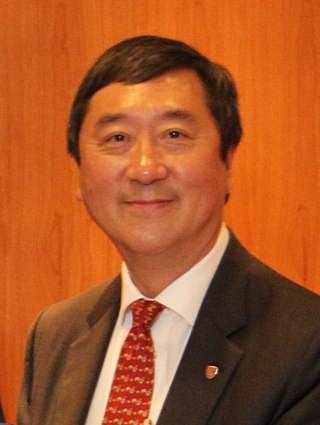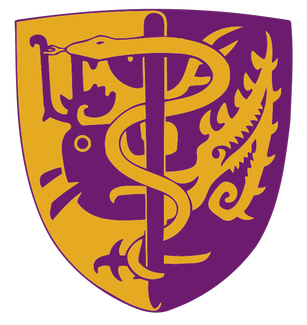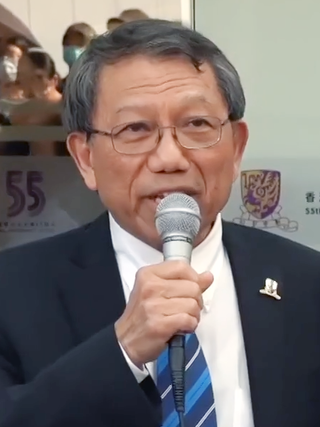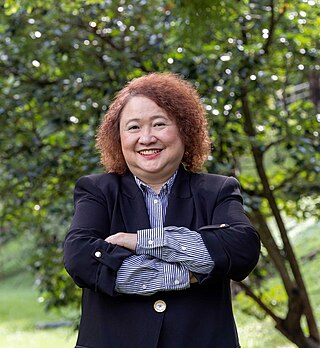Related Research Articles

The Chinese University of Hong Kong (CUHK) is a public research university in Sha Tin, New Territories, Hong Kong.

Prince of Wales Hospital is a regional acute government hospital located in Sha Tin, New Territories in Hong Kong. It is also a teaching hospital of the Faculty of Medicine of the Chinese University of Hong Kong (CUHK).

The Education University of Hong Kong (EdUHK) is a public university in Ting Kok, New Territories, Hong Kong.

The Hong Kong Red Cross is the national Red Cross society of Hong Kong as part of the International Red Cross and Red Crescent Movement. Its head office is in West Kowloon.
The Chinese University of Hong Kong Faculty of Law is a law school in Hong Kong.
The Centre for Research on the Epidemiology of Disasters (CRED) is a research unit of the University of Louvain (UCLouvain). It is part of the School of Public Health located on the UCLouvain Brussels Woluwe campus, in Brussels, Belgium.

Joseph Sung Jao-yiu is a Hong Kong physician and gastroenterologist, and the current Dean of Lee Kong Chian School of Medicine at the Nanyang Technological University (NTU), also serving as the Senior Vice President of NTU. Previously, he was the Vice-Chancellor and President of the Chinese University of Hong Kong (CUHK).

Gabriel Matthew Leung is a Hong Kong physician and epidemiologist, currently serving as the executive director of the Hong Kong Jockey Club. From 2013 to 2022, he was the longest-serving Dean of Medicine at the University of Hong Kong, where he was also the inaugural Helen and Francis Zimmern Professor in Population Health. Formerly, he was Hong Kong's first Under Secretary for Food and Health and fifth Director of the Office of the Chief Executive at the Government of Hong Kong.

Faculty of Medicine of The Chinese University of Hong Kong (CUHK) (Chinese: 香港中文大學醫學院) was established in 1981 and consists of five schools which offer an array of undergraduate and postgraduate programmes in the field of medicine, nursing, pharmacy and public health. The Hong Kong's Prince of Wales Hospital is the faculty's teaching facility and base of research. The medium of instruction of all programs is English while Chinese is also retained for the teaching of Chinese Medicine.

The Chinese University of Hong Kong, Shenzhen (CUHK-Shenzhen) is a public research university in Shenzhen. Located on the southern coast of China near Hong Kong, it is a joint venture between the Chinese University of Hong Kong and Shenzhen University, as the local partner. CUHK-Shenzhen was officially founded on 11 October 2012, and approved by the Ministry of Education of China on 16 April 2014.

Emily Ying Yang Chan is a clinical humanitarian doctor and global academic expert in public health and humanitarian medicine based in Hong Kong. She is Assistant Dean and Professor of the Chinese University of Hong Kong Faculty of Medicine, Professor at the Jockey Club School of Public Health and Primary Care, Director at the Centre for Global Health (CGH), Director of the Collaborating Centre for Oxford University and CUHK for Disaster and Medical Humanitarian Response (CCOUC), Director of the Centre of Excellence (ICoE-CCOUC) of Integrated Research on Disaster Risk (IRDR), Visiting Professor of Public Health Medicine at the Oxford University Nuffield Department of Medicine, Fellow at Harvard University FXB Center for Health and Human Rights, Honorary Professor at University of Hong Kong Li Ka Shing Faculty of Medicine, and Fellow at Hong Kong Academy of Medicine. She was appointed CEO of the GX Foundation in 2019.

Edward Lau Kwok-fan, MH, JP is a Hong Kong politician. He is the member of the executive committee of the Democratic Alliance for the Betterment and Progress of Hong Kong (DAB) and former member of the North District Council, representing Yan Shing until 2019. In the 2016 Hong Kong Legislative Council election, he succeeded DAB veteran legislator Ip Kwok-him in the District Council (First) functional constituency to the Legislative Council of Hong Kong.
Frederick M. "Skip" Burkle, Jr. is an American physician known for his work in human rights, international diplomacy and peacemaking, humanitarian assistance, and disaster response. He has been called "the single most talented and experienced post-conflict health specialist working for the United States government." His medical qualifications include pediatrics, emergency medicine, psychiatry, public health, and tropical medicine.

Jennifer Leaning is an American health scholar currently the François-Xavier Bagnoud Professor of the Practice of Health and Human Rights at Harvard T.H. Chan School of Public Health and former Editor-in-Chief of the International Physicians for the Prevention of Nuclear War's Medicine & Global Survival. She is also Associate Professor of Medicine at Harvard Medical School and a faculty member in the Department of Emergency Medicine at Brigham and Women’s Hospital.

Rocky Tuan Sung-chi is a Hong Kong medical researcher and bioengineer, currently the vice-chancellor and president of the Chinese University of Hong Kong, where he served as distinguished visiting professor and director of the Institute for Tissue Engineering and Regenerative Medicine prior to taking up the vice-chancellorship. Previously he was on the faculty at the University of Pittsburgh, where he held a number of roles: Arthur J. Rooney Sr. Professor of Sports Medicine and the executive vice chair of the department of Orthopaedic Surgery, and a professor in the department of bioengineering. He was the director of the Center for Military Medicine Research and an associate director of the McGowan Institute for Regenerative Medicine. Despite his position in Hong Kong, he continues to serve as the director of the University of Pittsburgh's Center for Cellular and Molecular Engineering. For the 2018 fiscal year, he was one of the top 25 highest-paid University of Pittsburgh employees.

The 2019 CUHK campus conflict, also known as the siege of the Chinese University of Hong Kong and Chinese University of Hong Kong conflict, was a part of the 2019–2020 Hong Kong protests. As protesters disrupted traffic to facilitate a general strike on 11 November 2019, other protesters inside Chinese University of Hong Kong (CUHK) threw objects onto railway tracks near the University station, to which the Hong Kong Police Force responded by shooting pepper bullets at students and launching volleys of tear gas into the campus. The next day saw various clashes and skirmishes between the two sides, with the police storming into campus to conduct arrests while the protesters, in response, threw petrol bombs. After nightfall, the university's vice-chancellor and president Rocky Tuan arrived to seek mediation with the police, who refused to negotiate. The conflict escalated into widespread protests in various parts of Hong Kong in an attempt to divert the police's attention. At least 119 students were injured.
Natalia Linos is an American social epidemiologist and politician who was a candidate for Massachusetts's 4th congressional district in the 2020 election.
Siân Meryl Griffiths is a senior British public health physician who is an expert on global public health. She is best known for co-chairing the 2003 SARS Inquiry for the Hong Kong Government.

Mei-Po Kwan is a geographer known for her research contributions in Geographic Information Science, and human geography, particularly as they apply to time geography and human mobility. She is the Choh-Ming Li Professor of Geography and Resource Management at The Chinese University of Hong Kong (CUHK), Director of the Institute of Space and Earth Information Science (ISEIS) of CUHK, Director of the Institute of Future Cities of CUHK, and Head of Chung Chi College of CUHK.
Francis Ka Leung Chan is a Hong Kong gastroenterologist. He is the former Dean of the Faculty of Medicine, Chinese University of Hong Kong (CUHK) and the Choh-Ming Li Professor of Medicine and Therapeutics. Previously, he was the Associate Dean (Clinical) of CUHK Faculty of Medicine and the director of the Institute of Digestive Disease at CUHK.
References
- ↑ "Collaborating Centre for Oxford University and CUHK for Disaster and Medical Humanitarian Response (CCOUC)". ccouc.org. Retrieved 24 June 2016.
- ↑ "Collaborations and Ventures, Nuffield Department of Medicine, Oxford University". University of Oxford. Archived from the original on 28 May 2016. Retrieved 24 June 2016.
- ↑ "Hongkongers are ill prepared for aftermath of natural disaster". South China Morning Post. 19 November 2013. Retrieved 27 June 2016.
- ↑ "HK$40 kit bag that makes difference of life or death". South China Morning Post. 4 April 2014. Retrieved 27 June 2016.
- ↑ "Hong Kong people not ready to deal with natural disasters, experts say". South China Morning Post. 24 March 2015. Retrieved 27 June 2016.
- ↑ "More lives saved with bottom-up approach to disaster relief". South China Morning Post. 19 August 2014. Retrieved 27 June 2016.
- ↑ "RTHK Radio 3's morning current affairs programme "Hong Kong Today" --Workshop on reducing disaster risks". RTHK. Retrieved 27 June 2016.
- ↑ "RTHK Radio 3's main evening newscast "Newswrap" (18:00 – 19:00, 26 April)". RTHK. Retrieved 27 June 2016.
- ↑ "Young Hongkongers lagging the old in adapting to green lifestyle". South China Morning Post. 26 April 2016. Retrieved 27 June 2016.
- ↑ "Health experts train local communities to prepare for disasters". Reuters. 15 March 2016. Retrieved 27 June 2016.
- ↑ "Centre for Research on the Epidemiology of Disasters (CRED)". cred.be. Retrieved 24 June 2016.
- ↑ "Harvard Humanitarian Initiative". hhi.harvard.edu/affiliated-programs/. Retrieved 24 June 2016.
- ↑ "FXB Center for Health and Human Rights". fxb.harvard.edu. Retrieved 24 June 2016.
- ↑ "Integrated Research on Disaster Risk International". irdrinternational.org. Retrieved 23 December 2016.
- ↑ "Four New ICoEs Joined IRDR Family!".